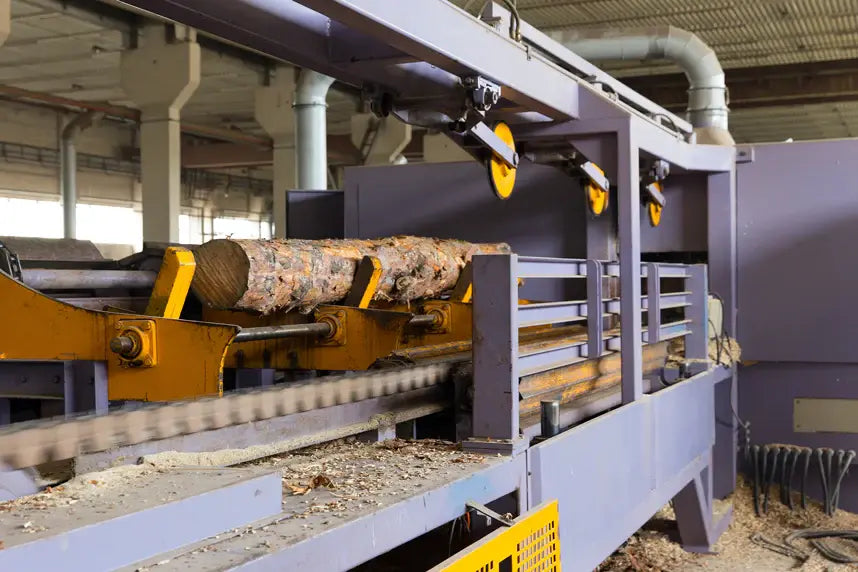Woodworking air compressors are widely used throughout the industry, from lumber processing to powering woodworking tools. There are several aspects to consider when choosing an air compressor for woodworking operations, including compressor type, size and air treatment options.
Air Compressor Applications in Woodworking
Compressed air is a highly versatile power source in woodworking settings, including furniture making, cabinet making, particle board production, flooring and building supplies, and more. From powering versatile pneumatic tools to facilitating dust management, air compressors have become a cornerstone of the woodworking industry.

Millwork and Lumber Processing
In millwork and woodworking operations, sorting lumber and separation of lumber stacks can be facilitated with compressed air. Air compressors power large lathes, saws and equipment for cutting wood and lumber processing. Compressed air is also used to ensure that lumber is clean, free from debris and ready for the next phase. In some facilities, pneumatics control automated machinery components, contributing to processes like sorting, stacking, holding logs and packaging.
Manufacturing
Pneumatic (air-powered) tools have become integral to woodworking. Their efficiency, durability, safety and ease of use make them preferred choices for many applications. Pneumatic tools used in woodworking shops and factories include:

- Nail guns, palm nailers, staple guns, framing guns and air hammers
- Air ratchets, impact wrenches, air drills and pneumatic screwdrivers
- Air-powered saws and lathes
- Pneumatic planes, files, sanders, routers and chisels
- Orbital, belt or disc sanders
- Pneumatic clamps
- Blowguns
In larger manufacturing facilities, compressed air may also be used to power conveyor belts, power lifts, material handling equipment, hold-down rolls, and large industrial planers, lathes, turners and other woodworking equipment.
Painting and Finishing
Spray paint equipment utilizing compressed air guarantees even coatings, making wood products look polished and professional. Compressed air is used for both large spray booths and hand-operated spray guns for applying paints, lacquers and finishes.
Veneering and Laminating
Vacuum presses, which are used to attach veneers to woodworking projects, often employ compressed air systems to create the necessary vacuum.
Pneumatic Conveying
Air compressors can power pneumatic conveying systems to transfer wood chips and sawdust from one location to another within a facility. For example, in lumber mills, green sawdust may be conveyed to dryers for use in pellet production or to furnaces to be used as fuel to heat boilers.
Dust Collection Systems

Sawdust is a significant problem in woodworking shops. An efficient dust collection system is needed to maintain a clean working environment. Compressed air is used to pulse excess dust off filters in the dust collection system, improving filter longevity and reducing maintenance requirements.
How to Choose a Compressed Air System for Woodworking
Your woodworking setup is unique, and so are its requirements for compressed air. There are a number of important considerations to keep in mind when choosing a compressed air system for woodworking applications.
CFM (Cubic Feet per Minute)
Compressors are rated by how much air (in Cubic Feet per Minute, or CFM) they can provide at a particular pressure. Different tools have varying airflow demands. To figure out how much compressor capacity you need, aggregate the CFM requirements of all tools that might operate simultaneously to determine your peak demand. A common rule of thumb is to add 30% to this number to ensure that you will have enough CFM to meet typical peak demand and accommodate any unusual activity or new tools.
(Learn more: What Size Compressor Do You Need?)
Depending on your operations, it may make sense to have two or more smaller compressors or a backup system that can be turned on during times of high demand. For example, a three-compressor system helped SCM Group, a woodworking equipment supplier, save energy and add flexibility to their operations.
PSI (Pounds per Square Inch)
Air pressure for a compressed air system is measured in Pounds per Square Inch (PSI). Most pneumatic tools are rated to operate at pressures between 90-100 PSI. Plant pressure should be set based on the highest PSI rating of connected equipment; there is no benefit to having a higher PSI than necessary. Air pressure will need to be set a few pounds above the maximum requirements to overcome pressure drop, which is the difference between pressure at the compressor outlet and pressure delivered at the point of use.
Should you get a one-stage or two-stage air compressor? A single-stage compressor is adequate for most applications operating at typical plant pressure. A two-stage compressor may be needed for a woodworking process requiring higher PSI.
Air Compressor Type
One of the most important decisions to make when buying an air compressor for woodworking is the compressor type. The best compressor for your operations depends on your total air demand, whether you need a portable or stationary compressor, and whether you are using air continuously or intermittently.
(Read more: Reciprocating vs. Rotary Screw Air Compressors.)
- Reciprocating Air Compressors (Piston Style): These are the go-to for many smaller woodworking shops. They operate using a cylinder-driven mechanism, with the motor driving the pistons. They are cost-effective, simple to maintain, and suitable for use in dirty or dusty environments. They are recommended for environments with intermittent demand. Another advantage is their relatively compact size. Small portable piston compressors are a favorite for many smaller shops. However, they are noisy and require more frequent maintenance.

- Rotary Screw Compressors: Rotary screw compressors offer continuous airflow, making them essential for mills and manufacturing facilities where tools and production machinery operate non-stop throughout the day. Because they’re designed for heavy-duty usage, they have longer life spans and require less maintenance in demanding industrial environments. They also generate less noise than piston-style air compressors.

Air Storage and Tank Configuration
Air storage needs are another essential consideration. Air receiver tanks store compressed air, providing a reserve that can be drawn on to power short, high-demand events or ensure consistent airflow and pressure. Air tanks also allow some excess moisture to drop out of the air supply. They may be integrated with the air compressor or separate.
- Most reciprocating air compressors and some rotary screw compressors come with an integrated storage tank. For smaller operations with intermittent demand, an integrated tank provides adequate storage and saves space.
- Most large rotary screw compressors do not have an integrated air storage tank. Instead, a separate air receiver tank is hooked up to the compressor. This provides more flexibility for facilities needing a bigger tank.
Air Treatment
Clean, dry compressed air is a benefit for most operations, including woodworking. Air quality requirements will depend on the woodworking process. Air used for powering pneumatic tools, for example, will not require the same air quality as more sensitive applications like paint lines. There are two main considerations when planning air treatment for a woodworking process.
- Air dryers are used to remove excess moisture from compressed air prior to use. Refrigerated air dryers (cycling, non-cycling or VSD), which can lower the dew point of compressed air to about 38°F, are adequate for most woodworking applications. Paint and coating lines and other moisture-sensitive applications may benefit from a desiccant air dryer. (Read more: Refrigerated vs. Desiccant Air Dryers.)
- Air filtration is used to remove additional contaminants from compressed air. Intake filters prevent dust and contaminants from outside air from entering the compression chamber. Inline air filters remove additional moisture, particulate and oil carryover from already compressed air. Filter selection depends on the air quality requirements of the application.
Lubricated vs. Oil Free Compressors
Both rotary screw and reciprocating air compressors come in both lubricated (oil-flooded) and oil-free versions. In an oil-flooded compressor, oil is used to lubricate moving parts and seal the air end. Some of this oil ends up in the air supply as oil carryover. Proper air filtration can reduce the oil level in compressed air enough for all but the most sensitive applications. Lubricated compressors are recommended for most woodworking operations due to their lower costs, longer service life, quieter operation and simpler maintenance. However, some sensitive applications like paints and finishings may benefit from an oil-free compressor. (Read more: Lubricated vs. Oil-Free Compressors)
Energy Efficiency
Compressed air system design must factor in operating and energy costs in addition to initial costs. Energy-saving features like Variable Speed Drive (VSD) air compressors can make a significant difference in overall energy consumption. It is also important to properly size the air compressor. If air demand is highly variable, consider whether it might be more energy efficient to add a smaller compressor that can be turned off when not needed instead of operating a bigger compressor at all times. Reducing pressure drop and lowering overall plant pressure can also have a dramatic impact on overall energy use. An energy audit can help woodworking shops discover opportunities for energy savings.
Compressor Maintenance

Maintenance ease and the availability of parts can also influence the choice of air compressor. Lubricated rotary screw compressors are known for their reliability and will require less frequent maintenance than a reciprocating compressor or oil-free compressor. However, reciprocating air compressors may be simpler for in-house maintenance teams to service. Operations with large rotary screw compressors may benefit from outsourcing preventative maintenance to professionals. Selecting a reputable compressor brand that has good parts availability for your area and working with a trusted service provider will save headaches and money in the long run.
Benefits of Using Air Compressors in Woodworking
Compressed air provides numerous benefits for the woodworking industry that enhance productivity, improve the quality of finished products, increase efficiency, and ensure worker safety.
- Compressed air provides consistent and controllable power, ensuring product uniformity.
- Pneumatic tools often have longer lifespans, reducing the need for frequent replacements.
- Pneumatic tools are lighter and easier to use than battery or electric tools, reducing fatigue, ergonomic injury and operator errors.
- Compressed air is a safer power source for woodworking tools, reducing electrocution risks and the potential for sparks that can ignite flammable wood materials.
Best Air Compressors for Woodworking Applications
For best results, work with a woodworking compressed air company that can help you choose the right air compressor and design the best system for your operations. Fluid-Aire Dynamics has a wide inventory of rotary screw and reciprocating compressors for woodworking from leading brands like PneuTech. We can help you select the right compressor and design a compressed air system for maximum reliability, energy efficiency and performance.
Contact the compressed air experts at Fluid-Aire Dynamics today.
